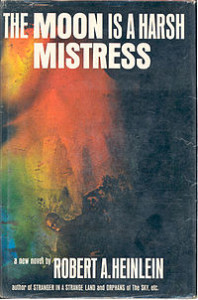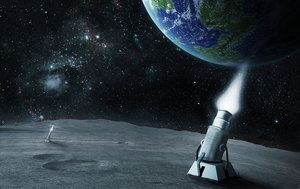




Last year we found a haul of first edition classic sci-fi books for just a few dollars each at a quaint little bookshop in Flagstaff including ‘The Moon is a Harsh Mistress’. Unfortunately since then, they have been in a decorative little stack on my bookshelf just looking good.
I tend to read in genres for long periods of time, and it’s been all too long since I read classic sci-fi from the 50’s and 60’s even though it’s a favorite genre of mine, a time when American writers really led the pack in a new area. Their stories were logical, scientific, the imagination both unlimited and predictive of the modern world. I tend to believe there is no new sci-fi that hasn’t been covered before, those guys back then were not just authors, they were scientists, theologians, engineers, even religion-builders and ultimate con-men (looking at you Hubbard).
The Moon, Luna, is filled with the descendants of a penal colony. There is no law except that of common sense, and the men and women are kept under the firm thumb of the Lunar Authority- an organization back on Earth that still sees ‘Loonies’ as a sub-class group of people. Loonies however are indispensable for the farming they do, pulling nutrients from the ice and rock of the Moon and growing it into precious grain that is sent to Earth.
The problem is that prices have never changed while inflation has, and in seven short years the Loonies will be subject to massive starvation and disaster. Earth doesn’t give a crap about Loonies, they have no idea how restricted their lives are by the Authority and would just as soon see the moon fill up with new convicts, than save the unique civilization Luna is home to. Earthworms don’t understand how hard it is to live on the moon, it’s only fit for societies undesirables they think. Earthworms don’t understand the rich and self-governing culture that Loonies have. Loonies are anything but political, and they aren’t cognitive of their ability to band together, but instinctively, they do.
An underground movement is carefully constructed to the smallest detail with only four people at the top, one of them a supercomputer named Mike who ‘woke up’ and is lonely for company and a chance to prove he can be useful.
The genius in the writing is that it somehow encompasses the entire scope and fallout of the thing, with minimal detail from the eyes-only perspective of the first man to make friends with the computer and the only human that ever realized Mike ‘woke up; Manuel O’Kelly Davis. Heinlein’s style of writing might be copied, but I doubt successfully. With anyone else it would look underdeveloped and lazy, but Heinlein is anything but. Now I know why the book is considered so high in it’s genre, it’s a quick and simple revolution story written in a deceptively simple manner. It reads as an easy sketch, but shows an entirely new society complete with subterfuge, family love, society classes, politics and government. Small stuff right?
I hate to say this, but it’s been so long since I used my brain in the way reading classic sci-fi can require, that I had to read much slower than usual. That’s a good thing! There was a learning curve for me as Heinlein wrote not only mechanical specifics, but in an unusual choppy language filled with local idoms that are not really explained, only make clearer as you read. Don’t let that deter you though, about halfway through I was suddenly fully committed and excited about the story. Have you read this before? What did you think? Free Luna!
PS. This would make a great movie!











